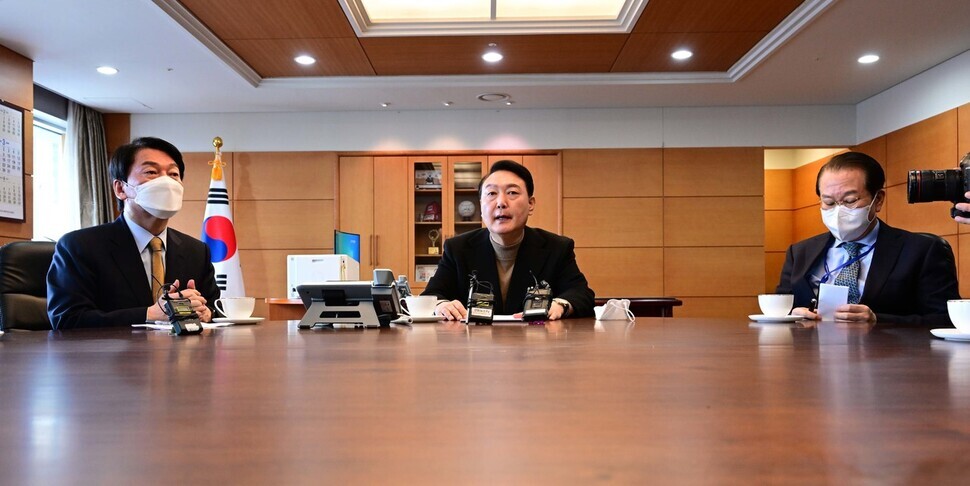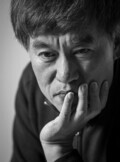hankyoreh
Links to other country sites 다른 나라 사이트 링크
[Column] As president-elect, Yoon has cold political realities to face


South Korean President-elect Yoon Suk-yeol appointed People’s Party leader Ahn Cheol-soo on Sunday to head up his presidential transition committee. If this collaboration produces some unexpected results after their pledge to create a “joint administration,” there’s nothing more you could ask for.
But Yoon has only just passed through the doorway when it comes to cold political realities.
In the election on March 9, he received 48.6% of the vote. In elections without runoffs, you can become president by a margin of a single vote.
In Yoon’s case, he won a slim margin of 0.73%, or 247,077 votes. If the people who didn’t vote are factored in, a solid 63% of South Korean voters did not pick him.
Not only that, but success for him as a president will be more or less impossible without the cooperation of the Democratic Party, which holds 172 seats in the National Assembly.
Even if the three People’s Party lawmakers align themselves with the 110 from Yoon’s People Power Party, that still isn’t enough to pass legislation. If Yoon has any hope of succeeding, he will first need to recognize this reality.
Some in Yoon’s party are banking on a sweep of the local elections that take place on June 1, after Yoon’s inauguration on May 10. They predict that this will be enough to carry them until the general elections in April 2024 — but two years is a long time. Limited to a single five-year term, presidents need to produce results early on when they have the momentum.
For all seven of the presidents — including Moon Jae-in — who have served since the Constitution was amended in 1987 to institute a system of direct presidential elections for a single five-year term, the trend has been an inversely proportional relationship between their grip on governance and the passage of time since their inauguration.
Even Kim Dae-jung, who was adept at realpolitik and all aspects of governance, struggled to cope with an opposition-dominated National Assembly.
Kim won the election on the strength of an alliance with the mainstream conservative United Liberal Democrats under Kim Jong-pil and Park Tae-joon. He managed to muddle through his administration after successively appointing both of them to be prime ministers — but when the so-called “DJP alliance” collapsed, he faced a tough battle.
On March 10, Yoon declared, “I think it’s a very natural thing in a democratic country for a president to have a parliamentary minority, and I believe that minority is an opportunity for democracy to substantially mature.”
It’s a good thing he views things this way. During the election, he said, “Even I have to take some cues from the Democratic Party.” He’s going to need to do more than that: making concessions to the Democratic Party, when necessary, while boldly walking away from those election pledges that run counter to the trends of the times or trigger particularly fierce objections.
As a first step, he should walk back his pledge to abolish the Ministry of Gender Equality and Family. His regressive tactic of using gender as a wedge issue failed to pay off — as we could see in the voting patterns of women in their 20s and 30s. It’s also a poor fit with the emphasis on “national unity” that Yoon has been proclaiming.
He also has to amend the Government Organization Act, but he has no hope of getting that past the National Assembly if the Democratic Party does not accept the amendment, with its 172-seat majority.
Yoon’s attitude of viewing regional and gender-based quotas as the “divvying up” of positions carries quite a lot of risks too. When past administrations have implemented such quotas, it has been nothing more than an attempt to level a playing field that’s skewed by regional and gender biases.
We can’t fault Yoon for saying that he wants to base his choices on experience and ability. But if he’s basing that on his experiences as a prosecutor, he ought to be more cautious.
The administration and Blue House are quite different from the Supreme Prosecutors’ Office, which is just a lone agency. The prosecutors were able to run things as “Yoon Inc.,” emphasizing internal trust and the expertise of specialists. Even that was only possible thanks to the support of the Moon administration, which agrees to its demands for the sake of investigations aimed at eradicating deep-rooted vices.
Yoon is surely aware of the concerns that the public harbor over what has become known as the “republic of prosecutors.” If he makes the decision as a former prosecutor general to abolish the vested interests that the prosecutors enjoy and take away some of their untrammeled powers, he would likely be applauded for it. He could go down in history as the president who achieved what neither Moon or Roh Moo-hyun could before him: the complete political neutrality of the prosecutors.
Hopefully, Yoon signaled a start to just such a trend with his pledge to abolish the post of the senior secretary to the president for civil affairs, with its stated aim of doing away with a holdover mechanism used to control political adversaries and opposing forces.
Yoon has pledged to achieve “national unity.” His efforts to form a joint administration with Ahn Cheol-soo are a good start, but too narrow in scope.
Yoon has said he admires the late Roh Moo-hyun as a president who battled vested interests and foul play. During his term, Roh said he intended to establish a “great coalition,” even if it meant giving up half his power. This ended in failure for him — drawing objections from internal interests and derision from conservatives — but it also represented one of the most innovative changes in approach in the history of South Korean politics.
In the past, Yoon has referred to the Moon administration as “plunderers.” But as the winner of the election, he could make a decision that would open up the prospects for a coalition and a cooperative approach to governance.
Yoon would do well to consider the belated words of reflection shared by lawmaker Kim Doo-kwan, who attributed the Moon administration’s failures to “confusing hate with righteousness” and “succumbing to ‘us vs. them’ logic and shielding their own.”
Please direct questions or comments to [english@hani.co.kr]

Editorial・opinion
![[Guest essay] Preventing Korean Peninsula from becoming front line of new cold war [Guest essay] Preventing Korean Peninsula from becoming front line of new cold war](https://flexible.img.hani.co.kr/flexible/normal/500/300/imgdb/original/2024/0507/7217150679227807.jpg) [Guest essay] Preventing Korean Peninsula from becoming front line of new cold war
[Guest essay] Preventing Korean Peninsula from becoming front line of new cold war![[Column] The state is back — but is it in business? [Column] The state is back — but is it in business?](https://flexible.img.hani.co.kr/flexible/normal/500/300/imgdb/original/2024/0506/8217149564092725.jpg) [Column] The state is back — but is it in business?
[Column] The state is back — but is it in business?- [Column] Life on our Trisolaris
- [Editorial] Penalties for airing allegations against Korea’s first lady endanger free press
- [Editorial] Yoon must halt procurement of SM-3 interceptor missiles
- [Guest essay] Maybe Korea’s rapid population decline is an opportunity, not a crisis
- [Column] Can Yoon steer diplomacy with Russia, China back on track?
- [Column] Season 2 of special prosecutor probe may be coming to Korea soon
- [Column] Park Geun-hye déjà vu in Yoon Suk-yeol
- [Editorial] New weight of N. Korea’s nuclear threats makes dialogue all the more urgent
Most viewed articles
- 1Behind-the-times gender change regulations leave trans Koreans in the lurch
- 2South Korean ambassador attends Putin’s inauguration as US and others boycott
- 3Family that exposed military cover-up of loved one’s death reflect on Marine’s death
- 4[Guest essay] Preventing Korean Peninsula from becoming front line of new cold war
- 5Yoon’s broken-compass diplomacy is steering Korea into serving US, Japanese interests
- 6Marines who survived flood that killed colleague urge president to OK special counsel probe
- 7Yoon’s revival of civil affairs senior secretary criticized as shield against judicial scrutiny
- 8Japan says its directives were aimed at increasing Line’s security, not pushing Naver buyout
- 91 in 10 marriages in Korea last year was with a foreign national
- 10[Column] The nuclear umbrella and the afterlife